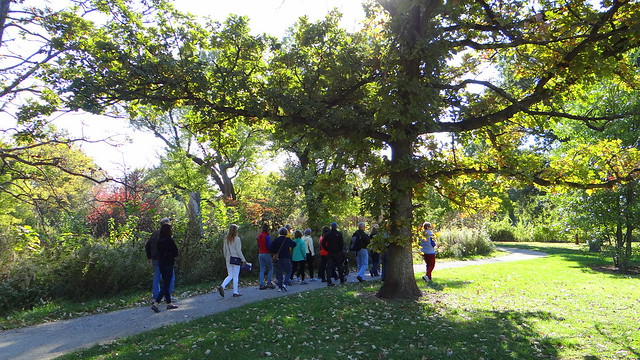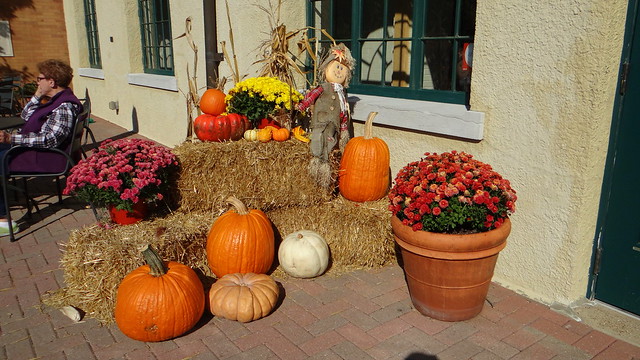Field Notes Guided Walk in Forest Park, 201013
October 23, 2013
On Sunday, the 20th of Oct, I went on
a walking tour of the nature reserve areas of Forest Park
with
of Forest Park. Here he is, with Bob Duffy of the St.Louis Beacon:
Here we are, heading out on the path:
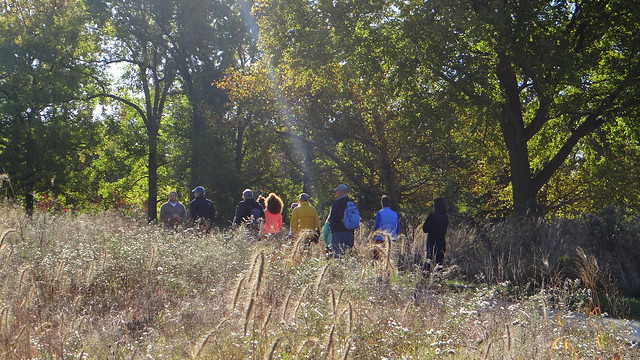 Peter talked to us about native and exotic plants and trees, the re-routing of the Des Peres river underground, the inter-connection of the various man-made water bodies in the park. I learnt something I did not know before...that all the water bodies in the Park contain tap water...the Des Peres river flows underground right through the park, and does not surface at all!
However, converting the habitat was one of the efforts undertaken by Forest Park Forever. Through controlled burns such as the one
the controlled burn of 2011 referred to here in The Beacon
he said that they were trying to convert this particular area into a prairie/savannah, but thanks to earlier-planted trees, and resurgence of plants, pines such as this beautiful one
Peter talked to us about native and exotic plants and trees, the re-routing of the Des Peres river underground, the inter-connection of the various man-made water bodies in the park. I learnt something I did not know before...that all the water bodies in the Park contain tap water...the Des Peres river flows underground right through the park, and does not surface at all!
However, converting the habitat was one of the efforts undertaken by Forest Park Forever. Through controlled burns such as the one
the controlled burn of 2011 referred to here in The Beacon
he said that they were trying to convert this particular area into a prairie/savannah, but thanks to earlier-planted trees, and resurgence of plants, pines such as this beautiful one
 were very common.
He told us how bare, or even dead, trees, support wildlife. This picture of a leafless tree with many
AMERICAN GOLDFINCHES
on it
were very common.
He told us how bare, or even dead, trees, support wildlife. This picture of a leafless tree with many
AMERICAN GOLDFINCHES
on it
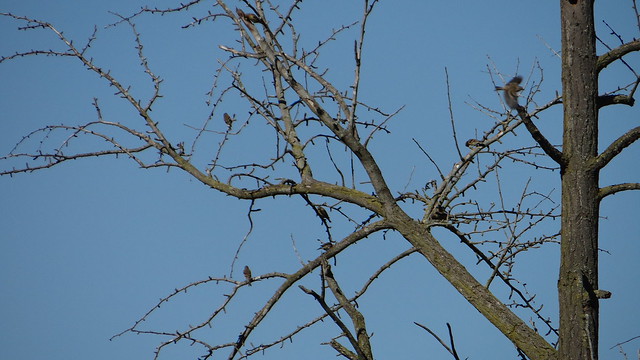 and this, of a
RED-HEADED WOODPECKER
pecking at the trunk of a tree, illustrated his point:
and this, of a
RED-HEADED WOODPECKER
pecking at the trunk of a tree, illustrated his point:
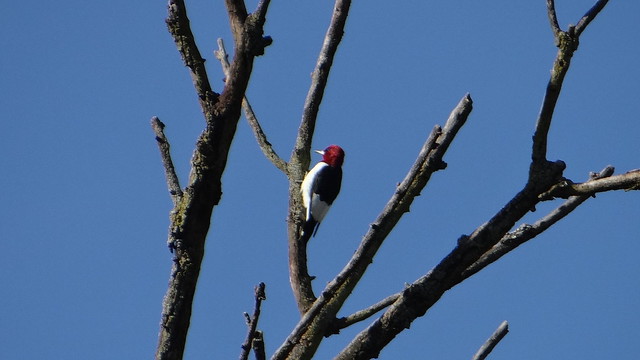 Here's some dead wood in a picture I like:
Here's some dead wood in a picture I like:
 Does this look like a bird walk? Because of the presence of Jocelyn Clogston (who took me to Rockwoods Reservation the first time) and her friend, Tom Bailey, who pointed out quite a lot of birds, it did, indeed, become one, too!
We saw this
TUFTED TITMOUSE
eating its breakfast:
Does this look like a bird walk? Because of the presence of Jocelyn Clogston (who took me to Rockwoods Reservation the first time) and her friend, Tom Bailey, who pointed out quite a lot of birds, it did, indeed, become one, too!
We saw this
TUFTED TITMOUSE
eating its breakfast:
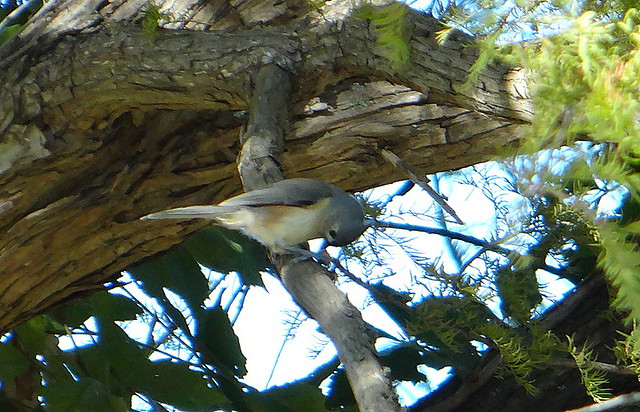 Tom pointed out this beautiful
RED-SHOULDERED HAWK
waiting patiently for prey:
Tom pointed out this beautiful
RED-SHOULDERED HAWK
waiting patiently for prey:
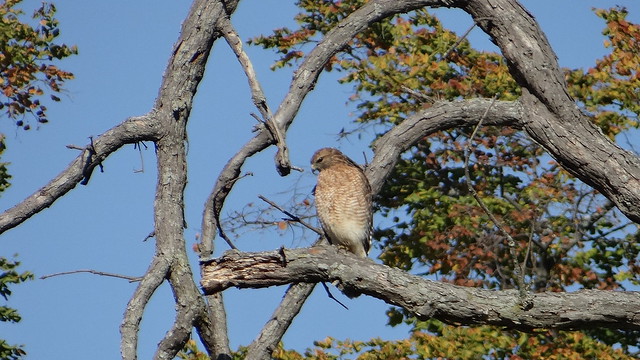
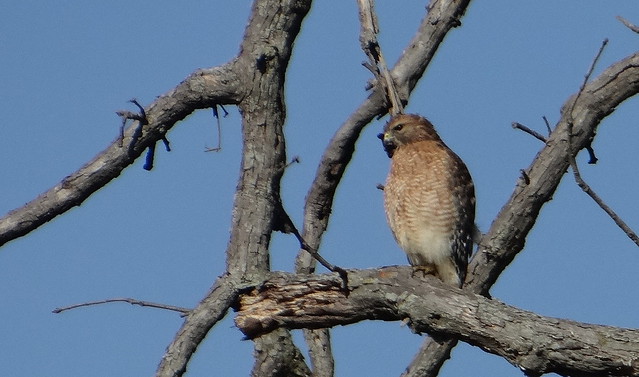 This
EASTERN PHOEBE
delighted us with another one, swooping along, catching insects:
This
EASTERN PHOEBE
delighted us with another one, swooping along, catching insects:
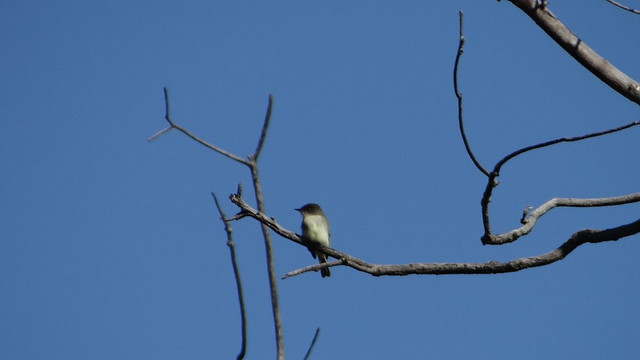 The usual
RED-TAILED HAWK
did a fly-past for us:
The usual
RED-TAILED HAWK
did a fly-past for us:
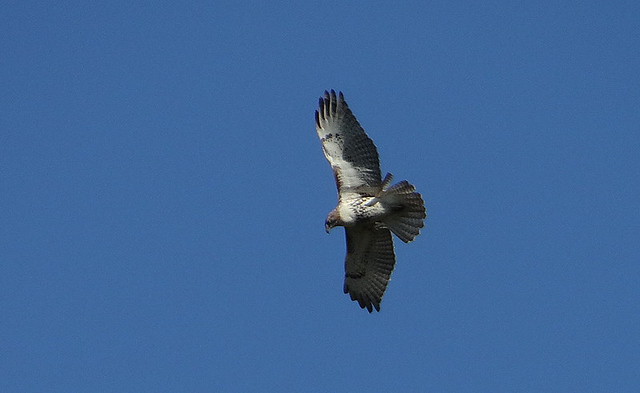 I got an
AMERICAN GOLDFINCH,
duller at this time of year, having lost the bright yellow of summer..
I got an
AMERICAN GOLDFINCH,
duller at this time of year, having lost the bright yellow of summer..
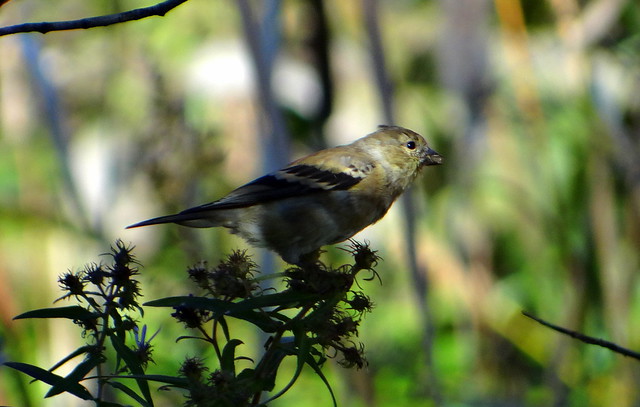 A
NORTHERN FLICKER
sat high on a tree:
A
NORTHERN FLICKER
sat high on a tree:
 Even the Robins and the Starlings are looking different now:
Even the Robins and the Starlings are looking different now:
 Tom showed me several Yellow-rumped Warblers, but I couldn't photograph them.
Here you can see the various kinds of land: prairie, shading into savannah,shading into woodland (it's not thick enough to call a forest)
Tom showed me several Yellow-rumped Warblers, but I couldn't photograph them.
Here you can see the various kinds of land: prairie, shading into savannah,shading into woodland (it's not thick enough to call a forest)
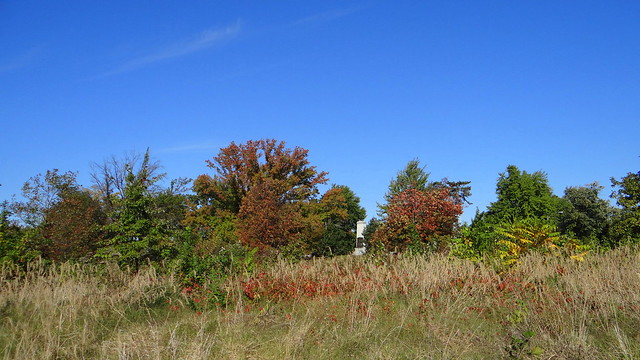 I was still riveted by sights such as these:
this (thanks to help from Fran Fulton)
VARIEGATED FRITILLARY:
I was still riveted by sights such as these:
this (thanks to help from Fran Fulton)
VARIEGATED FRITILLARY:
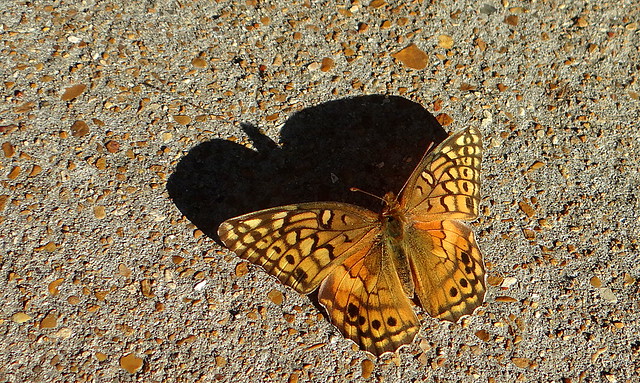 at the outset of the walk;
this
DELAWARE SKIPPER
on a
CHICORY flower:
at the outset of the walk;
this
DELAWARE SKIPPER
on a
CHICORY flower:
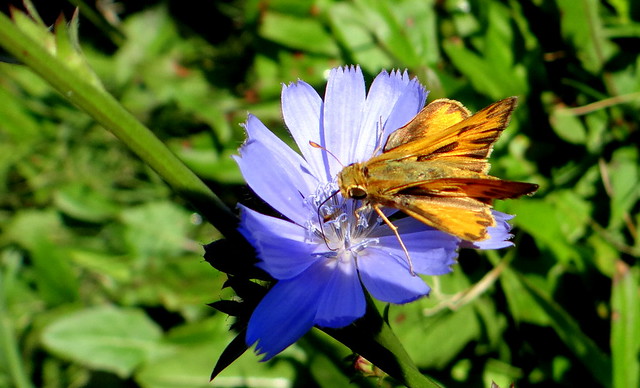 and this
GRASSHOPPER:
and this
GRASSHOPPER:
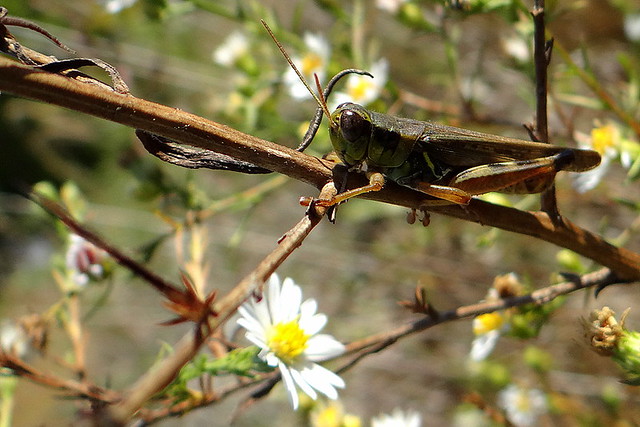 Tom told me that this
WOOLLY BEAR (Isabella Tiger Moth caterpillar)
Tom told me that this
WOOLLY BEAR (Isabella Tiger Moth caterpillar)
 was supposed to presage the severity of the winter to come, by the width of its brown band!
These aphids on the milkweed seed-pods
I walked back, enjoying the fall colors:
was supposed to presage the severity of the winter to come, by the width of its brown band!
These aphids on the milkweed seed-pods
I walked back, enjoying the fall colors:

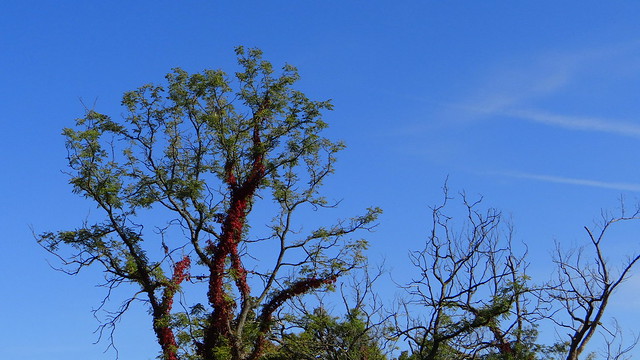 I peeped in on the
Orphan Car Show
(Apparently,Packard, Hudson, and Studebaker automobiles are considered glass and steel "orphans" because they are no longer in production.)
I peeped in on the
Orphan Car Show
(Apparently,Packard, Hudson, and Studebaker automobiles are considered glass and steel "orphans" because they are no longer in production.)
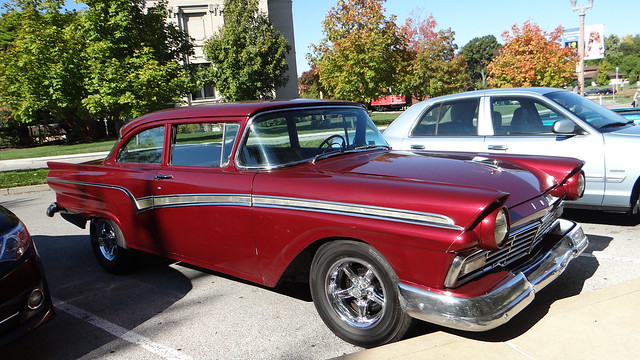
Let me close with the Halloween display at the Visitors’ Center:
and the
NEW ENGLAND ASTERS
that bloom in the fall:
It was a very enjoyable morning.


